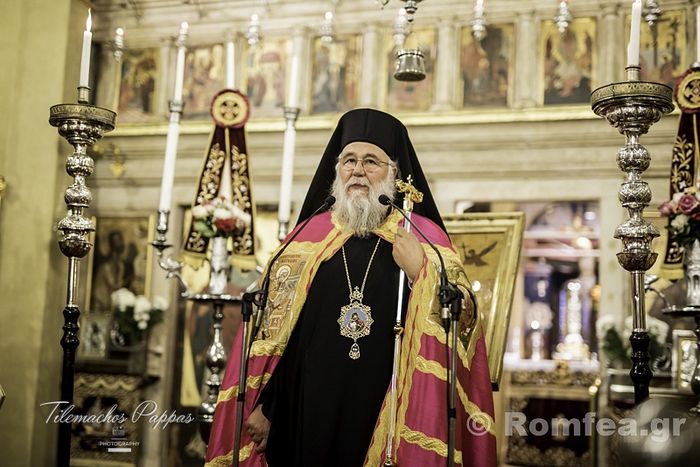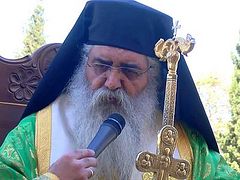Athens and Corfu, Greece; Morphou, Cyprus, April 15, 2020
 Metropolitan Nektarios of Corfu
Metropolitan Nektarios of Corfu
Several more Orthodox clerics have come under fire this week for celebrating the Divine services and giving Holy Communion to the faithful—this time from the Greek and Cypriot Churches.
Greek authorities have opened a criminal case against His Eminence Metropolitan Nektarios of Corfu, the Mayor of Corfu Merope Hydraiou, and Chairman of the Municipal Council Dimitrios Metallinos for violating the ban on holding religious services, for celebrating and attending Divine Liturgy for the Great Feast of Palm Sunday at the Church of St. Spyridon, report RIA-Novosti with reference to the Greek outlet Kerkya Simera.
The hierarch explained to the Prosecutor that the restrictions on services do not prohibit communing a few faithful, arguing that, “if we disconnect Holy Communion from the Sacrament of the Divine Liturgy, then we abolish the mission of the Church.”
He also explained that the extra people in the church were necessary for the 500-year-old annual procession with the relics of St. Spyridon, which took place inside the church because of the governmental restrictions.
His case will be dealt with by a special court that handles cases involving people caught in the act of a crime. About 20 people attended the service on Sunday and received Holy Communion.
Met. Nektarios had earlier publicly encouraged the faithful to ignore the quarantine restrictions and go to church anyways. His hearing has been scheduled for May 25, and he has canceled his planned parish visits for the rest of the week.
A government spokesman denounced the incident in Corfu, and another in the Koukaki neighborhood of Athens, where Fr. George Schoinas was photographed giving Holy Communion to some children out the back door of his church.
The Archdiocese of Athens announced that it is investigating the issue, and the Deputy Minister of Civil Protection and Crisis Management requested the intervention of a public prosecutor.
Fr. George explained that he did not invite the parishioners, but after the service, parents were knocking on the back door of the church, asking him to commune their children. Fr. George offered the children the Body and Blood of Christ, “following my priestly conscience,” he said. “Holy Communion is not forbidden and does not transmit diseases.”
“At that moment, following my priestly conscience, but also the long tradition of our Church, and being absolutely convinced that according to the decision of the Holy Synod and the statements of the Archbishop, Holy Communion is not forbidden for, it does not transmit diseases, but, on the contrary, transmits the body and blood of Christ that is our life, I certainly offered Holy Communion to the children and their parents outside the door of the holy Church, urging them to keep a distance from each other, which was observed. I thought everything I did was absolutely legal and canonical, that is, according to the holy rules of the Church and the laws of the State,” Fr. George said.
His Eminence Metropolitan Seraphim of Piraeus has spoken out in Fr. George’s defense, emphasizing that from a legal point of view, he committed no crime, as there is no ban on Communion, but rather on the number of people allowed to congregate.
Meanwhile, police in Cyprus are investigating whether His Eminence Metropolitan Neophytos of Morphou committed a crime by celebrating an open service on Palm Sunday.
As OrthoChristian previously reported, police interrupted the service after learning there were parishioners present. They found about 10 people at the church.
“No one is above the law,” a police representative told the Alpha Cyprus television station.


